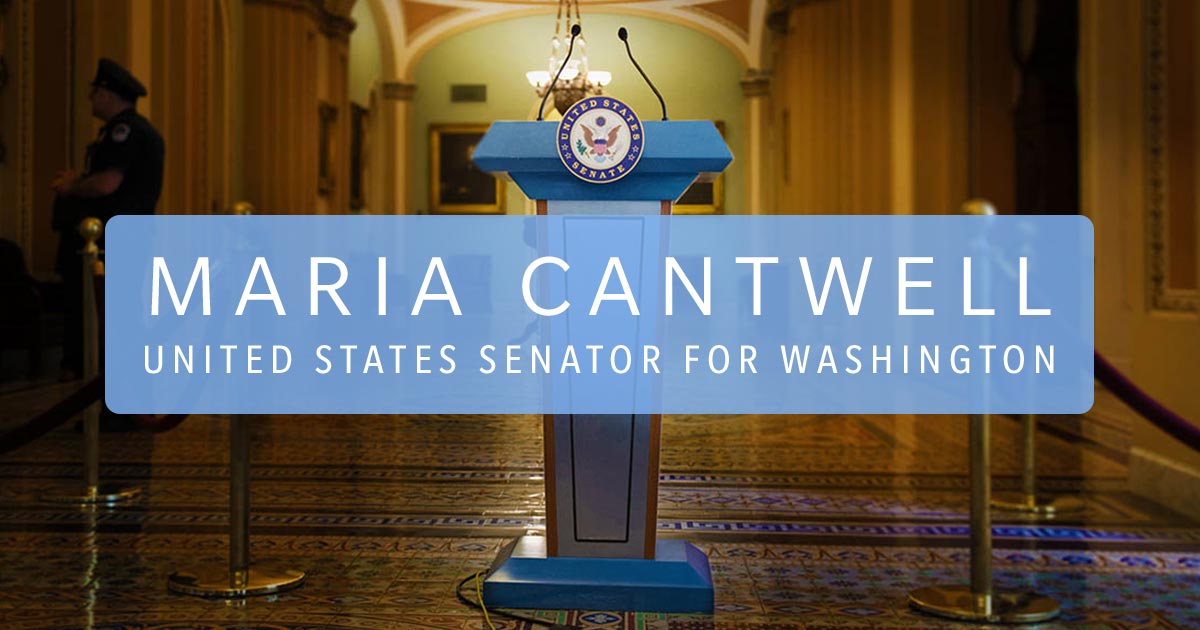Source: United States Senator for Washington Maria Cantwell
11.16.22
One Year Later: Biden’s Infrastructure Law Delivers Big on Broadband, Climate, & Clean Energy for Washington State
$3.7 billion in BIL funding disbursed to WA since law was signed 11/15/2021
WASHINGTON, D.C. – One year ago today, President Biden’s Infrastructure Law (BIL) was signed. Since then, more than $3.7 billion in funding has gone to Washington state for transportation, broadband, electrical grid infrastructure, clean energy, and climate resilience projects. U.S. Senator Maria Cantwell, Chair of the Committee on Commerce, Science, and Transportation, authored many of the provisions of the law to meet the needs of Washington state.
“The $3.7 billion from President Biden’s Infrastructure Law has jump-started critical projects across the state to improve our water, our air, and our economy,” Sen. Cantwell said. “From investments in battery manufacturing in Moses Lake to increasing internet access for Washington state Tribal and rural communities, these investments will support thousands of new good paying jobs. This is just the beginning – more dollars and more transformative projects are on the way that will help revitalize our state’s infrastructure and supply chains for the 21st century.”
Go HERE to view our release on Cantwell-supported BIL transportation-specific projects.
Today, the White House released a fact sheet indicating that Washington state received approximately 175 grant awards for infrastructure projects, including transportation, energy, and water awards.
The benefits of the BIL have already been felt across the state. While billions of BIL dollars that came to Washington state last year focused on transportation infrastructure, the law also created historic investments in broadband, clean water, green energy and extreme weather resiliency. Other than transportation projects, the BIL funding allocated to Washington state thus far included:
$100 million to expand high-speed internet access across Washington state: The BIL included $65 billion to provide access to affordable high-speed internet nationwide through the Internet for All initiative. Through this initiative, Washington state will receive at least $100 million for broadband deployment. In addition, in October 2022, Sen. Cantwell announced $64.3 million in Tribal Broadband grants to expand broadband access for the Lummi Nation and the Confederated Tribes of the Colville reservation, through another program of the initiative. The BIL also funded the Affordable Connectivity Program, which enables 1,046,000 households in Washington state to be eligible to receive a discount of up to $30 per month toward internet service; households on Tribal lands can receive a discount of up to $75 per month. Go HERE to apply to the Affordable Connectivity Program.
$161 million to improve infrastructure for safe & clean water: Washington state has received $161 million to improve water infrastructure to ensure access to clean and safe drinking water in fiscal year 2022 funding. Of this total, $63 million is dedicated to lead pipe and service line replacement, and $40 million is dedicated for safe drinking water investments.
$299 million for clean energy, electric vehicle chargers, and domestic battery manufacturing: The BIL invested a historic $3.5 billion to improve energy efficiency to lower energy costs nationwide. Of this total funding, Washington state received $47 million for weatherization, $25.6 million to build out a network of EV chargers over the next two years, $8.4 million through the State Energy Program, and $18.2 million to for improve grid resiliency to help prevent power outages.
This funding also includes $200 million in grants awarded to two battery component manufacturing facilities in Moses Lake, WA to spur domestic manufacturing of batteries for electric vehicles and the electric grid. Sen. Cantwell commended these awards earlier this year, saying, “The historic investments Congress made over the past two years are helping solve the next generation battery storage technology challenges right here in Washington.”
$386 million for infrastructure resiliency: Extreme weather events are becoming more frequent, and more costly for Washington state. According to the White House, in the last 10 years, 14 extreme weather events including wildfires, heat waves, and flooding have cost the state up to $5 billion in damages. Of the total $386 million allocated to Washington state for infrastructure resilience, $246 million was allocated to the Army Corps of Engineers for flood mitigation.
Additionally, the BIL also provided funding for the Bureau of Indian Affairs (BIA) Branch of Tribal Climate Resilience to help combat the disproportionate impact of climate change on Tribal communities. Sen. Cantwell recently announced $10.7 million in grant funding from the BIA for 10 Tribes and 2 Tribal Organizations in Washington state.
$4.9 million for safe and effective cleanup of Superfund and brownfield sites: Superfund sites are locations that have been severely contaminated due to hazardous waste but have no viable responsible party. The Environmental Protections Agency currently lists 39 Superfund sites in reuse that are eligible for funding across Washington state, including the Lower Duwamish Waterway which flows into Elliot Bay in Seattle and the Midnite Mine site on the Spokane Indian Reservation.
